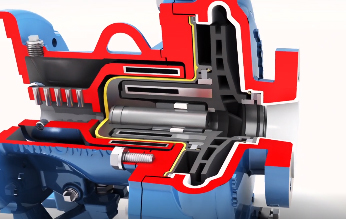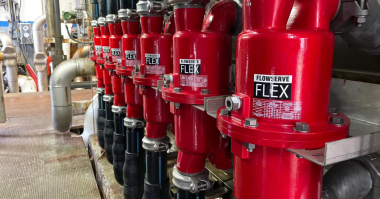To meet the stringent requirements pertaining to volatile organic compounds (VOCs), many petrochemical and oil and gas companies have turned to sealless pumps. These pumps are considered more sustainable than mechanical pumps because they do not use seals, which can fail and allow hazardous fluids to leak into the environment.
Using sealless pumps to meet strict sustainability requirements often meant sacrificing hydraulic performance and reliability, but this trade-off is no longer necessary when using sealless pumps that meet the API 685 standards for centrifugal pumps.
Sealless mag-drive pumps offer a way to balance sustainability and performance needs in environmentally critical applications. Extremely versatile, they provide outstanding leakage protection and can handle the high pressures, temperatures and aggressive/toxic media often found in the oil and gas and hydrocarbon industries.
The API 685 standard
The API 685 standard addresses the minimum requirements for sealless pumps manufactured for heavy-duty petrochemical and oil and gas applications. It applies to mag-drive and canned motor pumps and is very similar to the API 610 standard, one commonly associated with centrifugal pumps in the petroleum, petrochemical and natural gas industries.
The American Petroleum Institute recommends applying the 685 standard for applications when conditions exceed any of the following:
- Discharge pressure of 1900 kPa (275 psig)
- Suction pressure of 500 kPa (75 psig)
- Pumping temperature of 150°C (300°F)
- Rotative speed of 3600 rpm
- Rated total head of 120 m (400 ft)
- Impeller diameter of 330 mm (13 in)
Designed for sustainability and reliability
Sealless mag-drive pumps meet the higher sustainability requirements of the API 685 standard through a variety of innovative design features, including:
Containment shell prevents fluids from leaking into the environment
API 685 mag-drive pumps use a containment shell made from alloy C4, a nickel-based material, for high-efficiency performance and high corrosion resistance. Alloy C4 containment shells prevent process fluids from escaping from the pump and leaking into the environment. API 685 mag-drive pumps also feature a secondary containment system behind the shell and backup renewable rings that provide an additional layer of leakage protection.
Internal flushing system improves reliability
Instead of using an external flushing system, which may fail under aggressive conditions, API 685 mag-drive pumps leverage an internal flushing path designed to efficiently cool the magnets and lubricate sleeve bearings. The process fluid is fed from a high-pressure area behind the impeller to the magnetic coupling, and a self-cleaning filter helps prevent contamination.
Reduced maintenance and associated costs
In addition to features designed for sustainability and reliability, API 685 mag-drive pumps can also reduce maintenance labor and costs. Some of these pumps utilize a standard back pullout design, which simplifies general maintenance and inspections because the casing stays in-line and the piping connections remain intact.
This contained back pullout design also makes drive-end maintenance easy. The process fluid remains entirely confined, which eliminates the need to drain or purge the pump. Further, maintenance personnel aren’t exposed to potentially harmful process fluids.
Ideally suited for critical applications
API 685 mag-drive pumps are 100% leakage free, providing a sustainable alternative to other pumps. Because of their innovative design features, these pumps safely handle hazardous and volatile fluids in extreme conditions, making them ideal for use in petroleum, petrochemical and natural gas applications where companies have to balance performance, reliability and sustainability.
Learn more about Flowserve API process pumps at https://www.flowserve.com/en/products/pumps




